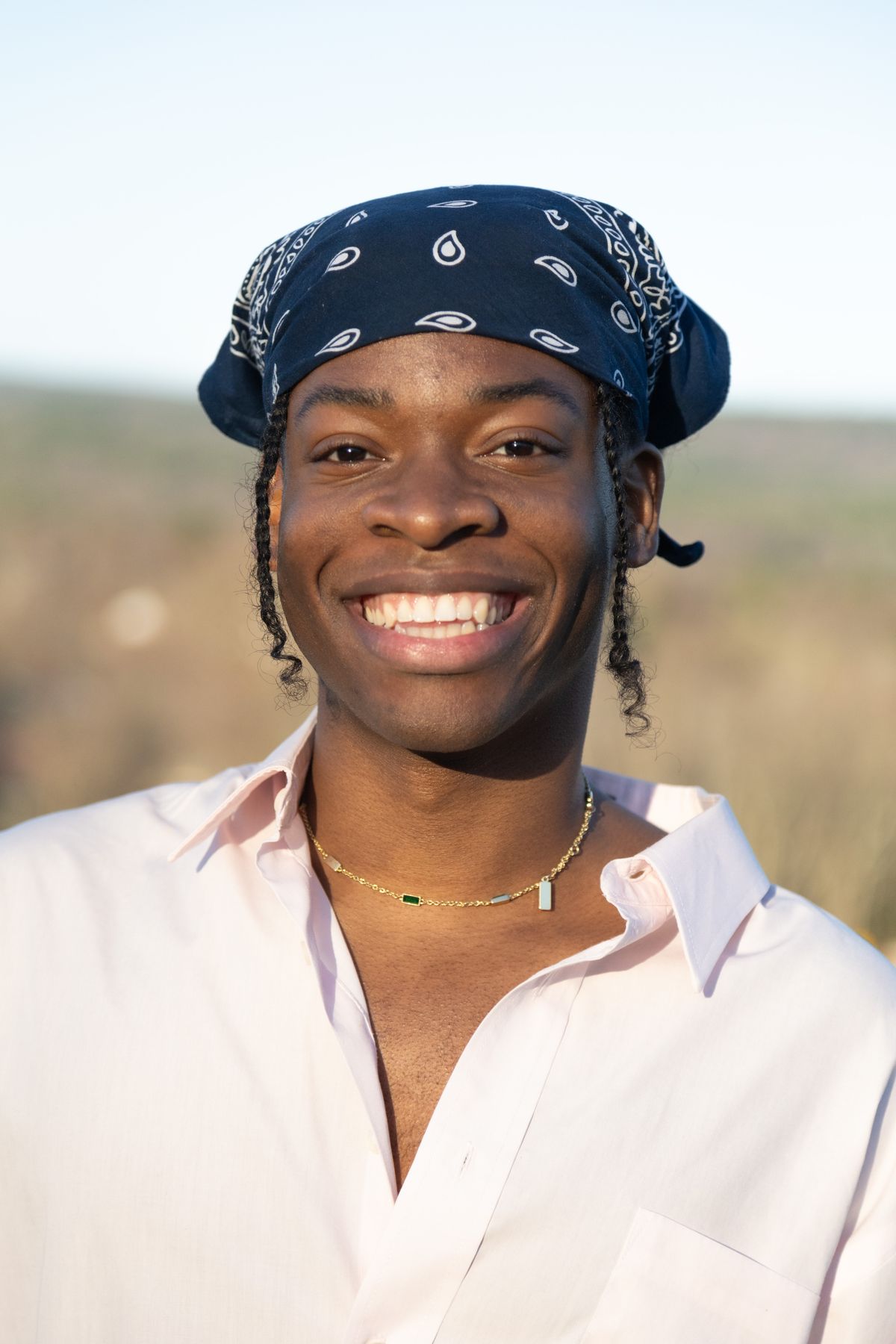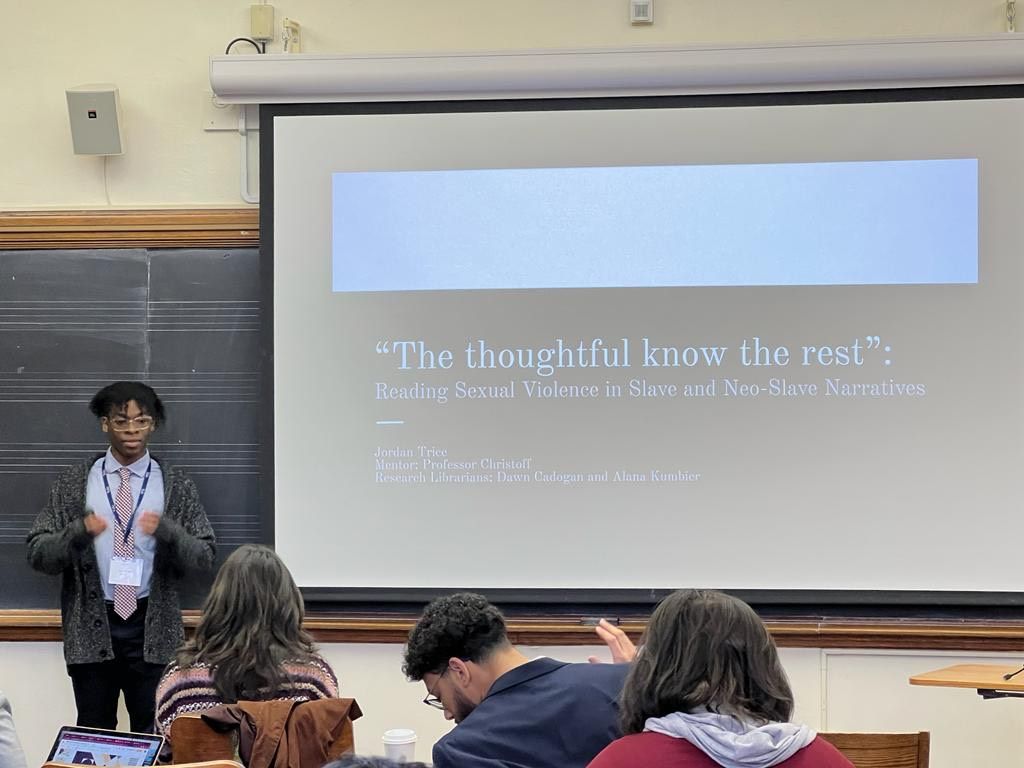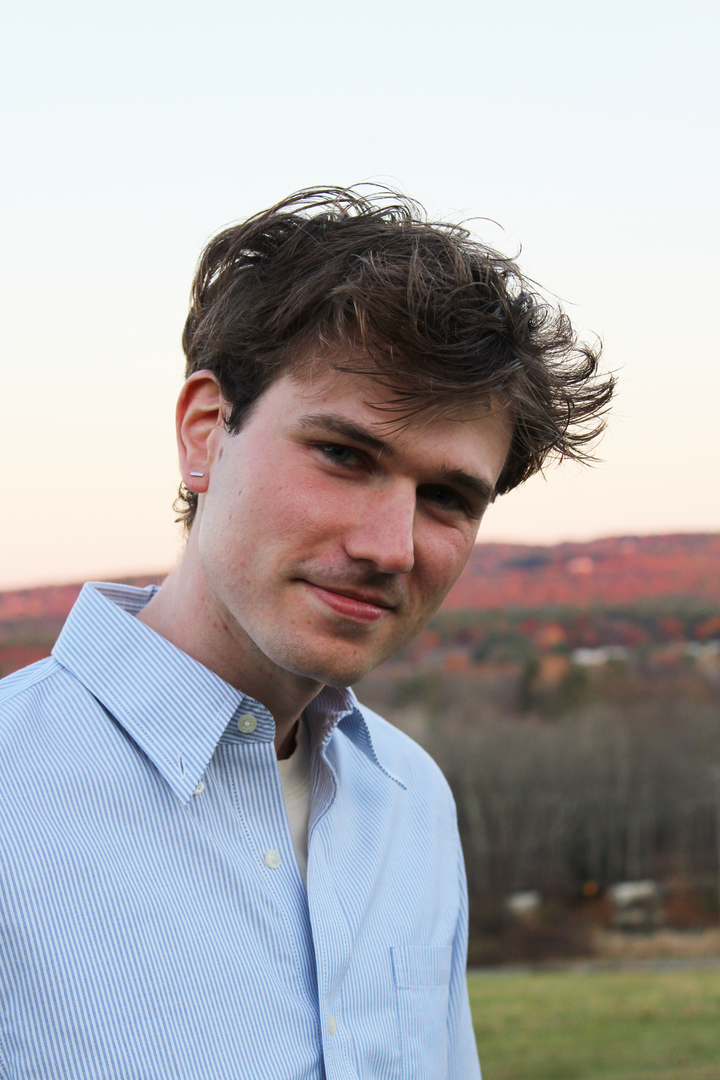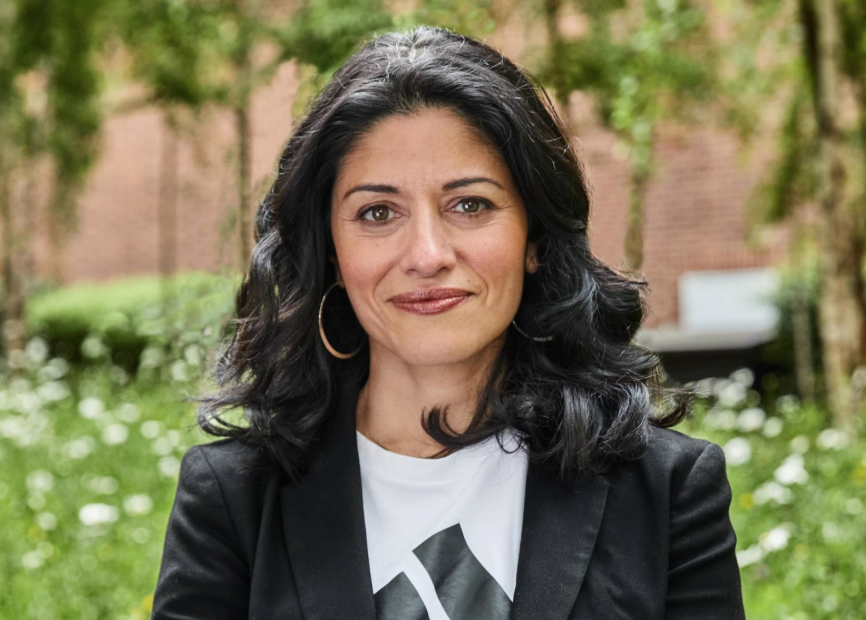Jordan Trice: “As I Make My Journey Through”
Known for being a “stellar intellectual” and an “extraordinary writer,” Trice has made an indelible mark on the Amherst College literary community.

Journey to Amherst
When I asked to interview Jordan Trice ’24, the first place he suggested was the Bruss Room — a cloistered lounge within Johnson Chapel accessible only to declared English majors via their ID. As an English and Sexuality, Women’s, and Gender Studies (SWAGS) double major and an employee of the English department, Jordan is well-acquainted with the space. We met in the room on a sunny afternoon, light pouring in from the window, bright against the dark teal walls.
One of the first questions I asked was simple: “You’re from Florida, right?” I was partially wrong; Jordan was born in Virginia, where he flip-flopped between a religious and public school for his elementary education. Neither school seemed to fit him or his twin sister, Julian. His family eventually moved to Florida, where Jordan attended middle and then high school. He was enrolled in a magnet program for — to my surprise — law and criminal justice. Criminal justice is a far cry from the soft-spoken intellectual I know. “So much outside of that realm,” he said, “and would never return to it now.”
Jordan had always planned on going to a liberal arts college. He applied to three schools: Haverford, Swarthmore, and Amherst. Initially, he was intent on attending Haverford, where an admired cousin of his goes. But, upon acceptance to Amherst, it seemed like the better choice.
I asked when he made the transition from law and criminal justice to English and SWAGS, and he gave me the name of one of his English teachers: Jeanne Winand Herdocia, who has won this year’s Phebe and Zephaniah Swift Moore Award for excellence in teaching. Jordan was the one who nominated her for the prestigious prize. “She was one of the people who was really foundational in me being able to love English so much,” he said.
Finding His Way
Jordan knew he wanted to do English from the beginning of his Amherst career, but came around more slowly to SWAGS. He initially planned to pursue classics, but a rocky path through an ancient Greek class made him reconsider. He then considered psychology, taking Developmental Psychology with Associate Professor of Psychology Carrie Palmquist and conducting psychology research for a year.
But even after a year of research, psychology wasn’t the path he would end up pursuing. “I realized that psych research wasn’t for me,” he told me. “I was interested in what it could do, but I wasn't interested in doing the work.”
He had briefly considered Black studies but ultimately decided against it, choosing to stick with a single major. He explained his thought process: “I love English. Let me just stick with that.”
And then, suddenly, it was junior spring, and Jordan realized he only needed two more SWAGS classes to complete the major — one of which he was currently taking. He decided to declare the major, since his interest in the field was evident.
“So that’s how I fell into my two majors,” he said, “But I was English all the way through.” He has much to show for it: he won the Corbin Prize (“awarded for an outstanding original composition in the form of poetry or an informal essay”) in 2022, and the James Charlton Knox Prize in 2023 to support his archival thesis work. He was also a contestant for the extremely prestigious Glascock poetry competition. This year, he received the Rolfe Humphrey Poetry Prize. According to Associate Professor of English Alicia J. Mireles Christoff, Jordan has “made the English Department feel like a home for countless other students”.
Outside of the classroom, Jordan has worked a variety of on-campus jobs. His first job was at the Mead Art Museum — and he spoke about it fondly.
“The first job I got when I came to Amherst was working at the Mead Art Museum,” he said. “I came in fall of 2020, we were at the height of Covid … we [were] masking or … testing three times a week, you couldn’t really be in a lot of spaces with people. But I remember that the Mead was open, and then one day I went in there, and they had [Francisco] Goya etchings … And I adored Goya — that was right when I was in my Goya phase — so I was so happy about that.”
He had asked the security guard if they were hiring and received an email. He interviewed for the position, got it, and continued to work there for three years.
The anecdote feels so reflective of who Jordan is: erudite and knowledgeable, but also ambitious and hard-working — someone with an appreciation for fine art, but also someone pragmatic, who seizes opportunities when he sees them.
It’s also how he got his research assistant position with Professor of Black Studies Carol Bailey — he applied for the position in the summer leading up to his junior year after long weeks of work as a Mellon Mays Undergraduate Fellow (a national fellowship with a chapter in Amherst that aims to increase representation of underrepresented racial groups in academia).
Although he was tired, he knew he couldn’t waste such a good opportunity. He got the job, thinking it would last two weeks, but has been working with her ever since. With Bailey, he’s helped plan conferences (one of which I attended) and has been published in the Journal of West Indian Literature.
“I’ve gotten so much out of my experience with her … It’s been an incredible time,” he said.
In an email to me, Bailey wrote, “I remain grateful to Ms. Rosemary Effiom, director of the Mellon Mays program for recommending Jordan to me when I was looking for a research assistant in the summer of 2022. Jordan is not only a stellar intellectual, meticulous researcher, and extraordinary writer; alongside these skills are his generosity, congeniality, loyalty, respectfulness, and care for others, especially the most vulnerable among us.”

Pushing Language Further
Of course, I had to ask him about his thesis. It’s an English thesis called “The Weather of Sexual Terror: Exhausting Language in American Slave and Neo-Slave Narratives.” In his words, it “takes both American chattel slavery and sexual violence-slash-terror as two realities we don't have much language for, and looks at where the varieties of American slave and neo-slave narratives turn when they reach that boundary of language.” I find the idea of the “boundary of language” intriguing. Jordan continues talking about his thesis, elucidating his work by explaining its structure. He compared texts about slavery by formerly enslaved people (such as “Incidents in the Life of a Slave Girl” by Harriet Jacobs) against those by authors born after abolition (such as “Beloved” by Toni Morrison and “The Underground Railroad” by Colson Whitehead) and analyzed the commonalities.
“[Whitehead] writes about sexual violence in a similar way to which Jacobs does,” Jordan said, “and I argue that in order to get somewhere in thinking about the language and forms in which we can talk about it, we have to be pushed a little further.”
He spoke with reverence for the literary greats, and when I asked about his inspirations, he once again brought up Toni Morrison. “Toni Morrison pervades every aspect of my life,” he said passionately. “I return to her works so, so much.” He has a quilt of Toni Morrison in his room, and her essay collection “Playing in the Dark” displayed “like a shrine.”
Jordan’s thesis isn’t ending at the end of his undergraduate senior year. In the fall, he’ll be pursuing a PhD in English at the University of Pennsylvania. He gushes about all the scholars he’s excited to meet: Margo Crawford, Zita Nunez, Simone White, Dagawami Woubshet, and Jo Park.
“It’s absolutely insane that they’re all there, and that I got accepted,” he said. Acceptance into UPenn is certainly no small feat, but knowing Jordan, it’s hardly surprising.
Reflections on Amherst
When I asked Jordan to look back at his time at Amherst, he brought up Covid. The current senior class’ freshman year was undeniably marred by the pandemic, but when Jordan talked about it, he spoke with tenderness.
“I’ve been thinking a lot about being in a place … where you can slow down a little bit,” he said. “First year when it was the height of Covid and I lived in the Greenways, I would be on the Rail Trails … because it was one of the few places we could actually kind of see people and be outside and just, I don’t know, listen to music and walk and just breathe some fresh air for a bit. [That] was so important for me.”
He continued, “I go hiking a lot with one of my friends, Jackie. … We’ve gone up the Notch, we went up to Summit Hill a couple weeks ago, which was such a good experience. And that is the one thing, thinking now going to a city, I will not have that kind of slow, contemplative space where I can just walk around at night and feel comfortable doing so, and feel that I can just, I don’t know, be outside in the woods. I love the woods so, so much.” (His last sentence felt especially reminiscent of the way he talks: when I ask Jordan how he is, he almost always replies with a cheerful “so, so good”.)
Living in Marsh, Jordan mentioned that his dorm is near Emily Dickinson’s house. “I have to believe that in some way,” he said, “she is holding my hand as I make my journey through.”
Jordan reiterated some advice that I’ve heard before, but have never fully appreciated: how important it is to rest.
“The one thing I’ve been telling everybody — including you — is that you must learn how to rest,” he said. “The work we are doing is so important, and you can’t do it when you’re burnt out and exhausted. There was one semester … where somebody said something that just really frustrated me so much. I went back for the rest of that semester, and every day I would read the moment in Beloved in which Stamp Paid realizes [he’s] exhausted, because I was just so exhausted at having to live in a world … where just casual racism was just allowed to such an extent.”
“It was exhausting to have to deal with that,” he continued. “And to have to explain why my work is important to other people constantly, and have it questioned constantly, and have my being here questioned constantly. So I’ve returned to that so much. And I think that was one of the moments where intellectually, emotionally, personally, I was burnt out and it took a very long time to crawl out of that space. But from there is where I’ve started to tell people … please take care of yourself. Because you can’t do the work that you need to do otherwise.”
He was happy at the opportunity to “get on [his] soapbox,” so I asked him if there was anything else he wanted to talk about.
“If we’re thinking specifically about Amherst, there’s so much that you can get out of just being kind to people … not just to your professors [who] you’re going to maybe, like, ask a letter of recommendation from or try to get an opportunity with … So many of the staff members here are so helpful,” he said. “The Val workers are some of the kindest people I’ve ever met. They’re always down to help. The IT people are everywhere doing their simplest jobs. [I’m] like, ‘I don’t know how to turn my laptop on.’ And they’re like, ‘I have a degree, but okay, I’ll help you turn your laptop on.’ People in the fellowships office, people in GEO [Office of Global Education], everywhere you go, the staff members, the custodial staff are all so, so, so kind.”
“And I mean, they put smiles on people’s faces every day. Renee is always so kind and welcoming when you come into Val. There’s also Mary, who used to work in Grab and Go, but now works in Val. I’m just always so excited to see [her] because she makes me so happy. And some people will just ignore them, and just like take the happiness and keep walking. But I think sometimes it's just so helpful to return the kindness. It doesn’t take much, but it makes such a big difference.”
“And I think, I mean, we really need that. We really, really need that collective care right now.”





Comments ()